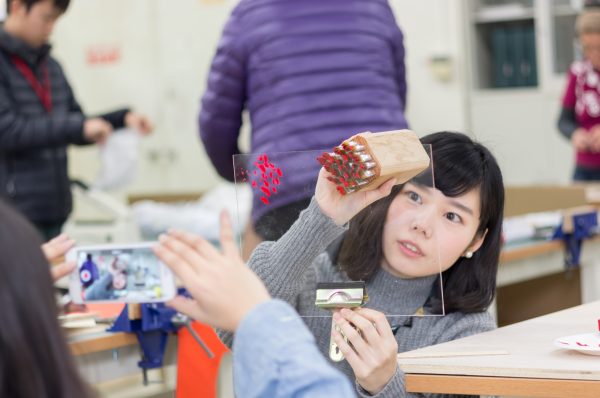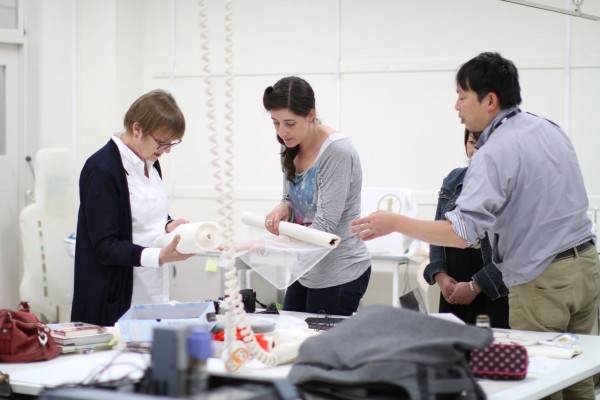この20年来におけるデザイン教育の最大の変化は、アイデア展開とその実体化において、自らの手によって繰り返し行われるモデル作りが、コンピュータ画面上でのそれに変貌したことです。デジタル技術は、概念的思考を創造過程の中心に位置させる傾向を生む一方、デザイナーは実際の素材に触れることから得られる知見と本質的なヴォキャブラリー、そしてつくる行為を通して得られる問題解決能力も失いつつあります。
KYOTO Design Labにおける、実践的アプローチの特徴は、デジタル・ファブリケーションを中核とするかたわら、実際の多様な素材を扱う中で得られる洞察と理解をも視野に入れていることにあります。そうした活動は、デジタル・ファブリケーション・スペース、木工及び金属の加工室、さらに紙漉きと陶器の工房といった広範な設備を活用する中で進められていきます。
また、京都は何世紀にも渡りさまざまな生活や文化に関わる工芸の中心地としても栄えてきました。この活動領域は、そうした伝統工芸家たちとの協力も包含しますが、その目的は、単なる従来工芸の模倣や保護ではなく、それらの継続的な革新と現代生活において生きる価値を創出することにあります。

ONE, TWO, MANY: Design Workshop with Kingston University

Woven Light: D-lab Design Associate Program with Michelle Baggerman
The past two decades have seen a shift in emphasis in design education away from the development and realisation of ideas through iterative physical prototyping to an increasing reliance upon their digital visualisation and delivery alone. While this has strengthened the conceptual and digital base of design education, it has led to a deskilling of designers in the essential vocabulary and intrinsic wisdom to be gained from working with materials and the problem solving involved in the act of making.
Kyoto D-Lab’s practice and project-based approach centres on recognising the advantages offered by digital fabrication alongside the insights and understanding gained from working with physical materials. The Kyoto D-Lab Factory facilitates this encounter in its comprehensive digital fabrication space, wood and metal workshops and papermaking and ceramics facilities.
Kyoto is also an active centre for cultural crafts of different genres, which have been practiced over the centuries. Another focus of our work is through collaborative projects with local craft workshops. Our aim is not to preserve traditional crafts through precise replication but to evolve and continuously innovate to keep them alive and relevant to contemporary life.

ONE, TWO, MANY: Design Workshop with Kingston University

Woven Light: D-lab Design Associate Program with Michelle Baggerman